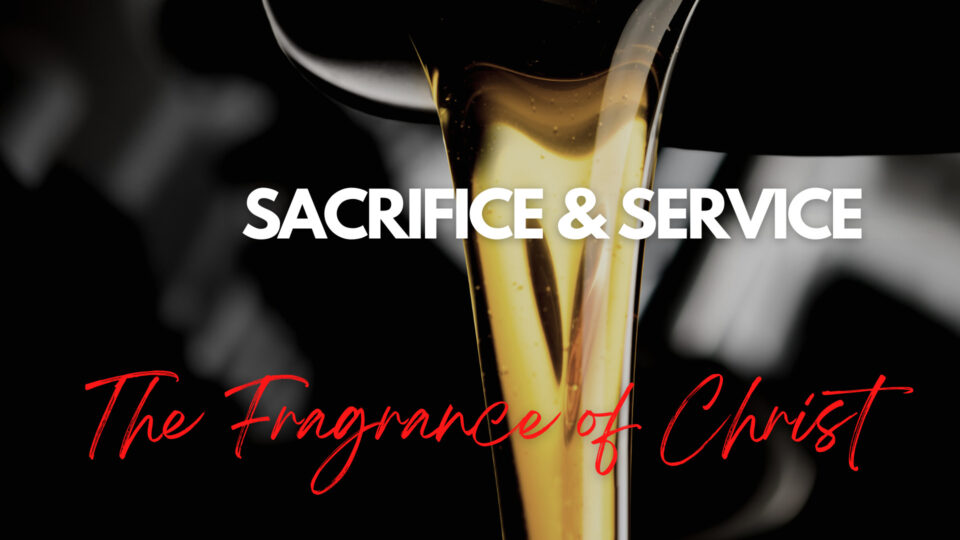
Taste and See God’s Goodness: The Jackson Willms Story
As I glanced out the front window and watched Jackson Willms and his care aide make their way up the...
Join us online at 9:00 am and 11:00 am Watch Online

And when Jesus was in Bethany at the house of Simon the leper, a woman came to Him having an alabaster flask of very costly fragrant oil, and she poured it on His head as He sat at the table. But when His disciples saw it, they were indignant, saying, “Why this waste? For this fragrant oil might have been sold for much and given to the poor.” But when Jesus was aware of it, He said to them, “Why do you trouble the woman? For she has done a good work for Me. For you have the poor with you always, but Me you do not have always. For in pouring this fragrant oil on My body, she did it for My burial. Assuredly, I say to you, wherever this gospel is preached in the whole world, what this woman has done will also be told as a memorial to her (Matthew 26:6-13 NKJV).”
Not much is said about the woman who anointed Jesus at Bethany. The details of her background were not included in the passage, and if she said something during the encounter, it was not recorded. The centerpiece of this passage is the alabaster flask.
According to some commentaries, it was Jewish tradition to give a young woman a jar of expensive perfume when she came of age. This would be used as a dowry when she was engaged. Since the woman in this passage was still in possession of her alabaster flask, we can probably conclude that she was likely unmarried and that the oil was more of an inheritance—a form of emergency support that could be sold in case of financial need, especially if her parents passed away and could no longer support her.
So, when this woman anointed Jesus in Bethany, she was literally pouring out her inheritance, her life savings, to honor Jesus. It was a one-time, extravagant act of love. Concerning this incredible sacrifice, Judas said, “What a waste! Couldn’t this oil be used more efficiently or effectively for the ministry?”
It wasn’t just Judas who felt this way. The passage describes all the disciples being indignant at this apparent waste.
Sacrificial worship is personal and can often be misunderstood. I’ve been reminded of that through our Grade 2 and 3 Kids Church curriculum this year. We have studied the lives of Isaiah, Jeremiah and Ezekiel and noticed that God’s call required deep commitment and sacrifice, yet their message was still rejected. Not only that, God even told these men ahead of time that they would be rejected, and yet they were still to carry on and preach the message He had given them to share.
If we were to evaluate this plan, and outcome, through the lens of man, we would say it was a waste of three godly men’s lives. Yet we know that because they were obedient and fulfilled what God asked them to do, their ministries were successful in His eyes.
The line between sacrifice and waste can be so fine that even Jesus’ disciples had difficulty discerning the difference. Jesus clearly saw this woman’s heart and loved her extravagant outpouring so much He forever memorialized her “wherever this gospel is preached.”
What we can learn from this encounter is that it is not foolish nor is it ever a waste to surrender or even sacrifice our lives for Jesus. Although it is not profitable for us and may even be wasteful in the eyes of man, it is an honor and privilege to pour out our lives at the feet of Jesus, who poured out His own life for us unto death.
And there’s even more for us to learn from this encounter in Bethany.
In Mark 14:3-9, the oil is identified as pure nard which is an incredibly fragrant perfume. Pure nard was only meant to be used in small quantities because a little would go a long way. By breaking the flask and pouring the entire contents over Jesus’ head, He would have smelled like nard for as long as a week.
The timeline of events would place Jesus, in a week’s time, on the cross. This was exactly what Jesus prophesied, “She has come beforehand to anoint My body for burial (Mark 14:8).” So, on the cross at Calvary, Jesus would still have smelled of this fragrant nard oil.
But Jesus was not the only one who smelled like this on that day. The woman who anointed Him at Bethany would have been scented the same way because of their close interaction.
In my imagination, I see her in the crowd at Calvary, watching Jesus’ sacrifice on the cross as she is marked with the exact same fragrance as her Lord. Although her sacrifice is overshadowed by His greater sacrifice, in that moment these two shared an intimacy that no other person had on that day.
As Jesus gave up His life for us, we get to pour out our lives for Him, and in doing that, we get the gift of His aroma on our lives. This aroma is offensive to some, who may reject it, but pleasant to others. It is not up to us to decide the outcome; it’s simply our honor to bear His scent, the aroma of Christ, in our lives.
“For we are to God the pleasing aroma of Christ among those who are being saved and those who are perishing. To the one we are an aroma that brings death; to the other, an aroma that brings life. And who is equal to such a task? Unlike so many, we do not peddle the word of God for profit. On the contrary, in Christ we speak before God with sincerity, as those sent from God (2 Corinthians 2:15-17).”

As I glanced out the front window and watched Jackson Willms and his care aide make their way up the...

Several years ago, Pastor Blair Butterfield was at a pastors’ conference in Lima, Peru where he bumped into a man...

The world tells us we can do it all. Try hard enough, work enough hours, do all the right things...